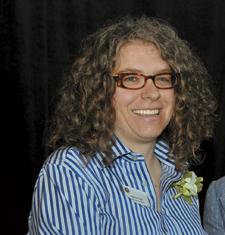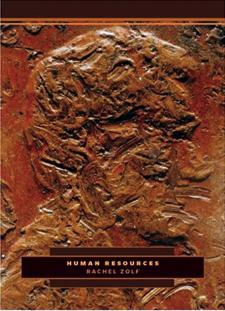Queer poet Rachel Zolf doesn’t believe in rhyming couplets or happy endings. She wants her readers to feel uncomfortable, to search for meaning instead of relaxing into the warm bath of a cozy narrative structure. “I don’t write poems that are going to tell you a simple, transparent thing,” says the Toronto-based writer. “Poetic language has the potential to help change the way we think, and it doesn’t have to be simply through a beautiful or ‘perfect’ poem. There are other ways.”
The jury of Ontario’s prestigious Trillium Book Award clearly agreed: her third book, Human Resources, won this year’s poetry prize. It’s a collection of poems inspired by her seven-year stint as a corporate communications writer. The poems are aggressive, powerful and often quite confusing. “People like me don’t win awards like that,” says Zolf, with a laugh. “There’s still a palpable resistance to experimental writing. But poetry can do the kinds of things that visual arts can do. It can really challenge you — like when you see art and think, ‘Eew gross,’ and it gets you thinking about why.”
There are certainly some “ooh gross” moments in Human Resources. “Pen drips with piss, shit and violation,” Zolf writes in a poem that borrows imagery from Greek mythology. Bodily functions are juxtaposed with corporate jargon — “step up to the plate,” “drop-dead deadline,” “performance management” — and codes that correspond to words from online search engines.
There’s humour too. “Sometime near the end of our tenure,” writes Zolf, “the HR ladies learned that the acronym for their new employee performance (Q5116) mold diaspora program translated as ‘blow job’ in French.”
The mix of registers is dis-concerting, but that’s the point. “I’m using the trope of corporatized experience to talk about other ideas that interest me,” says Zolf. “There’s a lot of noise in that kind of language that prevents us from talking to each other. Communication is supposed to be transparent, but really ‘plain language’ hides all these other codes underneath. I’m trying to bring those to the surface.”
Zolf took most of the jargon from a single client, whose emails were full of mixed metaphors. Did that client recognize herself? “I said to my old boss, ‘Don’t tell her about the book, she’ll sue me!'” says Zolf, “but she ended up getting hold of a copy and she loved it.”
On one level Human Resources is about being an outsider in a suffocatingly conventional workplace — an experience that’s sure to resonate with many queers. Her research unearthed an essay on conforming to heterosexual norms in the workplace, with instructions on choosing the “right” kind of tie and shirt — in other words, how to look straight. “You never really fit in unless you’re in a queer workplace — and that’s rare,” she says. “Lesbianism is an invisible identity, so you have to make choices about when you’re going to come out. Those choices have so many effects, especially feelings of shame.” Earlier this year the book was nominated for a Lambda Literary Award — one of the biggest queer prizes in the US.
Not bad for a writer who nearly wasn’t one at all. Zolf dropped out of university because she couldn’t write an essay, while her father, CBC journalist and writer Larry Zolf, wrote pages and pages every day. “It just seemed so easy for him,” she says. “Writing became this really charged place for me.” She didn’t write her first poem until she was dragged to a writers’ workshop in 1989. “It ended up being a pivotal moment in my life,” she says. “The writer, Di Brandt, drew poems out of me, and from that moment I knew that I had to write.”
Ten years later her first collection of poetry was published, the partly autobiographical Her Absence, This Wanderer. Her second, Masque, also plays with questions of identity. Voices such as “The Daughter,” “The Writer” and “The Critic” clash on the page, sometimes interrupting each other, sometimes corresponding. The reading experience changes according to which lines you choose to read first. “I was trying to get across that in each of us we have so many different faces,” says Zolf. “You show one to your boss, another to your lover and yet another to your mother. But within those identities we also carry the residue of other more fundamental identities, like being a lesbian or being Jewish, which shape everything.”
Years spent working as a documentary producer helped Zolf hone a rigorous research practice — a skill that feeds directly into her writing. “It’s not like the muse moves me to write my deep thoughts while I’m sitting in the garden,” she says with a smile. “Much of my work is informed by something that’s happening in the world, so I take an investigative approach to writing.” Her next book, a reaction to the Israeli-Palestinian conflict, borrows lines from human rights documents on torture. “I didn’t grow up with a pro- or anti-Zionist relationship to Israel,” she says, “but Israel talks about speaking in the name of Jews everywhere and what they do is affecting the world in so many different ways. I felt a lot of shame and a desire to write about what doesn’t get covered in Western media depictions of Israel and Palestine.”
These days she’s also basking in the glory of quitting the nine to five. Helped by the $10,000 Trillium prize money, Zolf’s days as a corporate writing machine are now behind her. And although the lack of day job has resulted in more “brain space” Zolf is far from introspective. Now more than ever she’s compelled to write about what’s going on in the world — and on our doorstep. “We’re living in a socially conservative time and it’s getting worse,” she says. “It doesn’t feel like the right time to just be writing about myself. There’s all these strictures on our independence and that’s why it’s more important than ever to speak up, to bring other voices together, silenced or otherwise.”


 Why you can trust Xtra
Why you can trust Xtra


